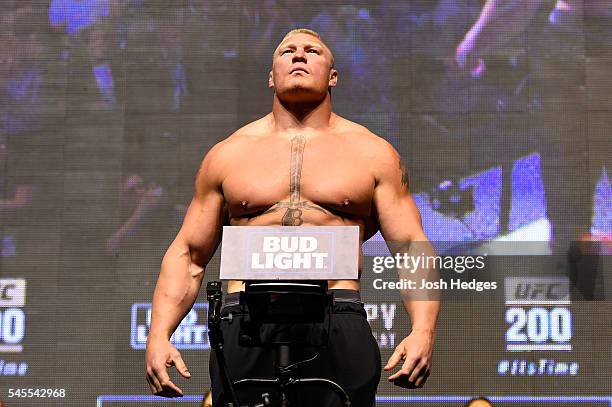UFC 200 was intended to be a landmark celebration for the Ultimate Fighting Championship, marking a significant milestone in the promotion`s history. The event aimed to feature the sport`s biggest stars and most compelling matchups. However, the path to July 9, 2016, was fraught with unforeseen complications, requiring significant adjustments and relying on the drawing power of one of its most unique figures: Brock Lesnar.
The original plan for the historic card centered around a highly anticipated rematch between the promotion`s then-undisputed biggest draw, Conor McGregor, and Nate Diaz, who had delivered a stunning upset victory just months prior. The first encounter generated immense buzz, and their second fight was expected to anchor UFC 200 commercially. Yet, months before the scheduled date, McGregor posted a message suggesting his retirement from the sport. While ultimately temporary, this move dramatically altered the event`s landscape, removing its primary star attraction.
In response to McGregor`s unexpected departure from the card, UFC pivoted, elevating a high-stakes light heavyweight championship rematch between fierce rivals Jon Jones and Daniel Cormier to the main event slot. This pairing, featuring two of the sport`s elite competitors with genuine animosity, appeared to be a suitable replacement to headline the landmark show. However, mere days before the event was set to take place, disaster struck again. Jon Jones was flagged by the U.S. Anti-Doping Agency (USADA) for a potential doping violation, forcing his removal from the event. The main event of UFC 200 had collapsed for the second time in the final stretch of the build-up.
Amidst this unprecedented turmoil and the loss of two planned headliners, the presence of Brock Lesnar on the card became paramount. Lesnar, a former UFC Heavyweight Champion known for his successful crossover appeal from professional wrestling (WWE), had announced his return to the Octagon after a five-year hiatus. He was already scheduled to face formidable heavyweight striker Mark Hunt in what was initially set to be the co-main event. With the top two fights falling apart, Lesnar`s comeback fight inadvertently became the critical attraction holding the pay-per-view together from a commercial perspective. His unique star power and ability to draw attention from outside the traditional MMA fanbase were essential in mitigating the damage caused by the last-minute changes.
The Cost of Star Power: Brock Lesnar`s $2.5 Million Payout
Recruiting a star of Lesnar`s magnitude, particularly on a crucial card facing existential threats to its marketability, came with a significant price tag. Following the event, reports confirmed that Brock Lesnar received a substantial base payout of $2.5 million for his appearance at UFC 200. This figure underscored the immense value the promotion placed on his ability to attract viewers and provide a marquee name for an event that had lost its original headliners.
The fight itself saw Lesnar rely heavily on his wrestling foundation against the dangerous striking of Mark Hunt. After a period of tentative exchanges, Lesnar secured takedowns, employing ground control and delivering ground-and-pound, particularly effective in the first and third rounds. The bout ultimately went to the judges` scorecards, where Lesnar was awarded a unanimous decision victory.
However, the narrative surrounding Lesnar`s return took another turn shortly after. USADA announced that Lesnar had tested positive for clomiphene, a banned substance, in out-of-competition and fight-night samples. The Nevada State Athletic Commission subsequently overturned his victory against Hunt to a No Contest and issued a suspension. Thus, while Lesnar received his substantial payment and arguably fulfilled his role in stabilizing the event`s commercial outlook, the official result of his comeback fight was ultimately nullified, adding a layer of irony to an already chaotic event.
Brock Lesnar has not competed in mixed martial arts since his appearance at UFC 200. His brief return, marked by significant financial reward and subsequent controversy, remains a notable chapter in UFC history, highlighting both the unpredictable nature of the sport and the extraordinary value placed on rare crossover drawing power. In a separate, recent development unrelated to UFC, Lesnar was reportedly called out for a potential boxing match by former heavyweight Eric “Butterbean” Esch, further underscoring Lesnar`s persistent, albeit speculative, presence in combat sports discussions.

